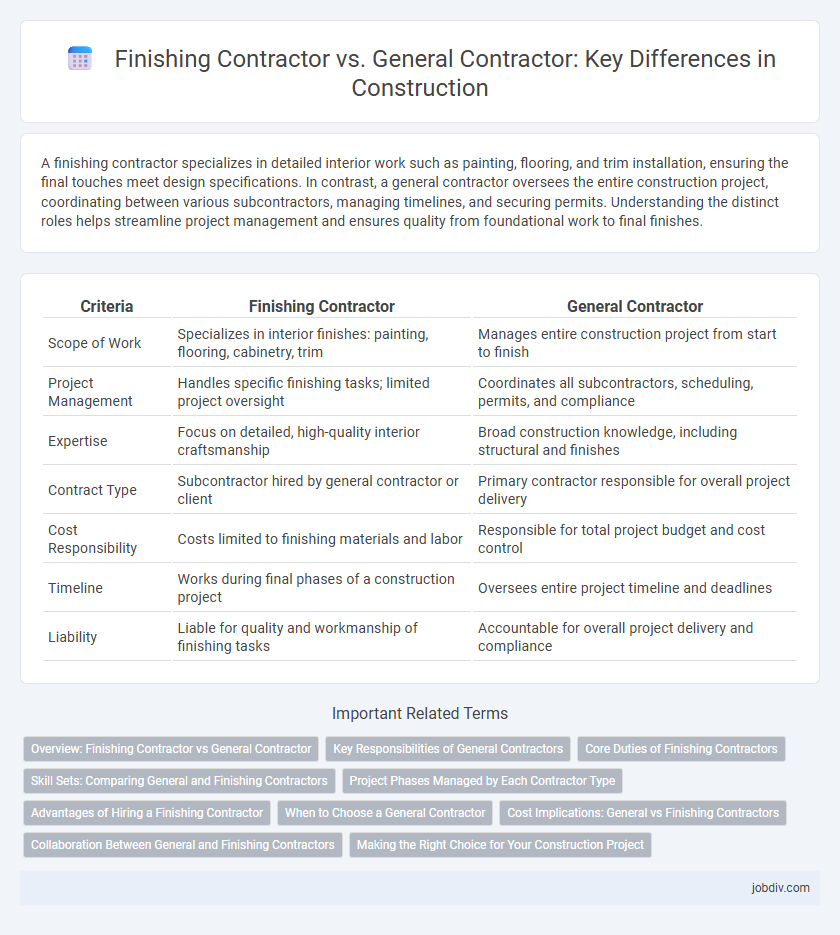A finishing contractor specializes in detailed interior work such as painting, flooring, and trim installation, ensuring the final touches meet design specifications. In contrast, a general contractor oversees the entire construction project, coordinating between various subcontractors, managing timelines, and securing permits. Understanding the distinct roles helps streamline project management and ensures quality from foundational work to final finishes.
Table of Comparison
| Criteria | Finishing Contractor | General Contractor |
|---|---|---|
| Scope of Work | Specializes in interior finishes: painting, flooring, cabinetry, trim | Manages entire construction project from start to finish |
| Project Management | Handles specific finishing tasks; limited project oversight | Coordinates all subcontractors, scheduling, permits, and compliance |
| Expertise | Focus on detailed, high-quality interior craftsmanship | Broad construction knowledge, including structural and finishes |
| Contract Type | Subcontractor hired by general contractor or client | Primary contractor responsible for overall project delivery |
| Cost Responsibility | Costs limited to finishing materials and labor | Responsible for total project budget and cost control |
| Timeline | Works during final phases of a construction project | Oversees entire project timeline and deadlines |
| Liability | Liable for quality and workmanship of finishing tasks | Accountable for overall project delivery and compliance |
Overview: Finishing Contractor vs General Contractor
Finishing contractors specialize in the final stages of construction, such as installing flooring, painting, and cabinetry, ensuring aesthetic and functional details are completed, while general contractors oversee the entire construction project from start to finish, managing subcontractors, schedules, and budgets. The general contractor acts as the primary point of contact for clients and coordinates all trades, including finishing contractors, to deliver the completed building. Understanding the division between finishing contractors and general contractors clarifies roles in project management and execution within the construction industry.
Key Responsibilities of General Contractors
General contractors oversee the entire construction project, managing schedules, budgets, and subcontractors to ensure timely completion. They coordinate various trades, including finishing contractors, to maintain quality standards and compliance with building codes. Their responsibilities also encompass securing permits, safety management, and communication with clients to align project goals.
Core Duties of Finishing Contractors
Finishing contractors specialize in the detailed completion of interior surfaces, including drywall installation, painting, flooring, and trim work, ensuring aesthetic quality and functional precision. Unlike general contractors who oversee the entire construction project, finishing contractors focus on the meticulous execution of final touches that define the project's visual and tactile appeal. Their expertise directly influences the durability and appearance of the finished space, making them essential for achieving design specifications and client satisfaction.
Skill Sets: Comparing General and Finishing Contractors
General contractors possess comprehensive project management skills, overseeing construction from foundation to completion, including scheduling, budgeting, and coordinating diverse trades. Finishing contractors specialize in detailed craftsmanship, excelling in tasks such as drywall installation, painting, flooring, and trim work that require precision and aesthetic focus. The skill set of a general contractor is broad and managerial, while finishing contractors offer technical expertise critical for high-quality interior finishes.
Project Phases Managed by Each Contractor Type
Finishing contractors specialize in the final stages of construction, managing tasks such as painting, flooring, cabinetry, and trim installation to ensure aesthetic and functional completion. General contractors oversee the entire construction process from site preparation and structural work to coordinating subcontractors and ensuring compliance with building codes. Understanding the distinct project phases managed by each contractor type helps optimize workflow and resource allocation for timely and quality project delivery.
Advantages of Hiring a Finishing Contractor
Hiring a finishing contractor ensures specialized expertise in detail-oriented tasks such as painting, flooring, and cabinetry, leading to higher quality and precision. Finishing contractors streamline project completion by focusing exclusively on final touches, reducing delays and improving efficiency. Their specialized skills often result in a more aesthetically pleasing and durable final product compared to a general contractor handling all phases of construction.
When to Choose a General Contractor
A general contractor is ideal for large-scale construction projects requiring comprehensive management of multiple subcontractors, permitting, and scheduling. They oversee the entire construction process, ensuring deadlines, budget adherence, and quality control are met efficiently. When project scope extends beyond specialized finishing tasks to include structural work, site preparation, and full project coordination, hiring a general contractor is the preferred choice.
Cost Implications: General vs Finishing Contractors
General contractors typically incur higher overall costs due to managing entire project scopes including procurement, labor, and compliance, while finishing contractors specialize in interior details like painting, flooring, and trim, often resulting in lower direct expenses. Hiring a finishing contractor can reduce costs by limiting services to specific phases, avoiding overhead associated with full project management. Cost-effectiveness depends on project complexity, with general contractors benefiting large-scale developments and finishing contractors suited for targeted, budget-conscious finishing work.
Collaboration Between General and Finishing Contractors
Effective collaboration between general contractors and finishing contractors ensures seamless project completion by integrating structural work with detailed finishes. Clear communication and coordinated scheduling between these parties minimize delays, enhance quality control, and align material procurement with project timelines. Leveraging specialized expertise from finishing contractors allows general contractors to maintain overall project oversight while achieving superior interior aesthetics.
Making the Right Choice for Your Construction Project
Choosing between a finishing contractor and a general contractor depends on the project scope and specialization requirements. Finishing contractors excel in detailed interior work like painting, flooring, and cabinetry, ensuring high-quality aesthetics and precise craftsmanship. General contractors oversee the entire construction process, coordinating multiple trades and managing the project timeline and budget, making them ideal for comprehensive building projects.
Finishing Contractor vs General Contractor Infographic

 jobdiv.com
jobdiv.com